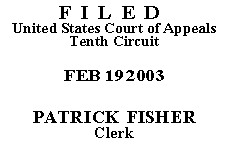

| RAUL URIAS,
Petitioner - Appellant, v. IRMA LUCERO, Warden, Western New Mexico Correctional Facility; ATTORNEY GENERAL FOR THE STATE OF NEW MEXICO, Respondents - Appellees, and JAMES ZIGLAR, Commissioner, United States Immigration and Naturalization Service, Respondent. |
|
This is a pro se 28 U.S.C. § 2254 prisoner appeal. Mr. Urias, a New Mexico state prisoner, was convicted of trafficking cocaine and conspiracy and sentenced to two concurrent nine-year terms of imprisonment. While Mr. Urias's state appeal was pending, the Immigration and Naturalization Service (INS) issued a final administrative removal order declaring Mr. Urias an aggravated felon to be removed upon completion of his sentence.
The state court of appeals affirmed the convictions on January 25, 1999. Contrary to Mr. Urias's wishes, his attorney did not file a petition for certiorari with the state supreme court. When he learned of this omission, Mr. Urias filed a pro se petition which was rejected as untimely, in that it was not filed within twenty days after final action of the court of appeals. Later, Mr. Urias was unsuccessful in pursuing state habeas relief.
In his federal habeas petition, filed November 22, 2000, Mr. Urias raised four claims: (1) ineffective assistance of counsel in failing to present an entrapment defense; (2) an erroneous ruling by the trial court in refusing to allow his former attorney's testimony regarding a co-defendant's exculpatory statements; (3) insufficient evidence to sustain his conviction; and (4) denial of due process in INS proceedings. The magistrate judge recommended that the first three claims be denied as time-barred. The magistrate judge also engaged in a thorough and thoughtful review of Mr. Urias's arguments on the three issues and determined that, in the alternative, the claims should be rejected on the merits. The magistrate judge treated the fourth claim as a § 2241 matter. He recommended adding the commissioner of the INS as a named respondent and ordering a response. Upon consideration of Mr. Urias's objections, the district court adopted the magistrate judge's recommendations. Mr. Urias appealed and the district court declined to issue a certificate of appealability (COA).
In the meantime, the INS filed its response in the district court. The magistrate judge recommended that the INS be ordered to cancel its notice of intent to issue a final administrative removal order. The district court adopted the recommendation and entered final judgment.
Because Mr. Urias's sole notice of appeal was filed before entry of final judgment, we must first address a jurisdictional issue. A notice of appeal ripens upon entry of a final judgment, if the earlier order did not dispose of all the claims against all of the parties. See Lewis v. B.F. Goodrich Co., 850 F.2d 641, 644-45 (10th Cir. 1988). Moreover, although Mr. Urias did not file a new notice of appeal after entry of final judgment, he did file his appellate brief. This brief may be construed as the functional equivalent of a notice of appeal. See Smith v. Barry, 502 U.S. 244, 248-49 (1992). We conclude that we have jurisdiction to consider Mr. Urias's request for a COA on the denial of his § 2254 claims.
In order for this court to grant a COA, Mr. Urias must "make a substantial showing of the denial of a constitutional right." 28 U.S.C. § 2253(c)(2). To do so, he must demonstrate that "reasonable jurists could debate whether (or, for that matter, agree that) the petition should have been resolved in a different manner or that the issues presented were adequate to deserve encouragement to proceed further." Slack v. McDaniel, 529 U.S. 473, 484 (2000) (quotations omitted).
As noted in the magistrate judge's recommendation, Mr. Urias filed his petition outside of the one-year limitations period set out in 28 U.S.C. § 2244(d)(1)(A) without a showing of entitlement to either statutory tolling or equitable tolling.(1) Statutory tolling under § 2244(d)(2) was unavailable to Mr. Urias because he did not engage in state post-conviction proceedings until expiration of the limitations period.(2) Additionally, Mr. Urias failed to demonstrate the "rare and exceptional circumstances" necessary to qualify for equitable tolling. Gibson v. Klinger, 232 F.3d 799, 808 (10th Cir. 2000) (quotation omitted).
We have carefully reviewed the record, including the magistrate judge's careful analysis of the merits of Mr. Urias's challenges to his conviction. We determine that Mr. Urias has failed to raise a debatable issue and therefore DENY his request for a COA and DISMISS.
Entered for the Court
Circuit Judge
*. This order and judgment is not binding precedent, except under the doctrines of law of the case, res judicata, and collateral estoppel. The court generally disfavors the citation of orders and judgments; nevertheless, an order and judgment may be cited under the terms and conditions of 10th Cir. R. 36.3.
1. Section 2244(d)(1)(A) provides:
(d)(1) A 1-year period of limitation shall apply to an application for a writ of habeas corpus by a person in custody pursuant to the judgment of a State court. The limitation period shall run from the latest of--
(A) the date on which the judgment became final by the conclusion of direct review or the expiration of the time for seeking such review[.]
2. Section 2244(d)(2) provides:
(2) The time during which a properly filed application for State post-conviction or other collateral review with respect to the pertinent judgment or claim is pending shall not be counted toward any period of limitation under this subsection.